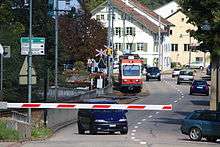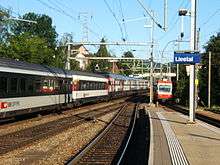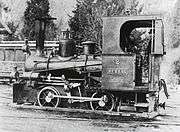Waldenburg railway
| Waldenburg railway | ||||||||||||||||||||||||||||||||||||||||||||||||||||||||||||||||||||||||||
|---|---|---|---|---|---|---|---|---|---|---|---|---|---|---|---|---|---|---|---|---|---|---|---|---|---|---|---|---|---|---|---|---|---|---|---|---|---|---|---|---|---|---|---|---|---|---|---|---|---|---|---|---|---|---|---|---|---|---|---|---|---|---|---|---|---|---|---|---|---|---|---|---|---|---|
 | ||||||||||||||||||||||||||||||||||||||||||||||||||||||||||||||||||||||||||
| Overview | ||||||||||||||||||||||||||||||||||||||||||||||||||||||||||||||||||||||||||
| Locale | Switzerland, Canton of Baselland | |||||||||||||||||||||||||||||||||||||||||||||||||||||||||||||||||||||||||
| Termini |
Liestal Waldenburg | |||||||||||||||||||||||||||||||||||||||||||||||||||||||||||||||||||||||||
| Operation | ||||||||||||||||||||||||||||||||||||||||||||||||||||||||||||||||||||||||||
| Opened | 1880 | |||||||||||||||||||||||||||||||||||||||||||||||||||||||||||||||||||||||||
| Owner | Waldenburgerbahn AG | |||||||||||||||||||||||||||||||||||||||||||||||||||||||||||||||||||||||||
| Technical | ||||||||||||||||||||||||||||||||||||||||||||||||||||||||||||||||||||||||||
| Line length | 13.1 km (8.1 mi) | |||||||||||||||||||||||||||||||||||||||||||||||||||||||||||||||||||||||||
| Track gauge | 750 mm (2 ft 5 1⁄2 in) | |||||||||||||||||||||||||||||||||||||||||||||||||||||||||||||||||||||||||
| Electrification | 1500 V DC | |||||||||||||||||||||||||||||||||||||||||||||||||||||||||||||||||||||||||
| Maximum incline | 3.8% | |||||||||||||||||||||||||||||||||||||||||||||||||||||||||||||||||||||||||
| ||||||||||||||||||||||||||||||||||||||||||||||||||||||||||||||||||||||||||



The Waldenburg railway (German: Waldenburgerbahn; WB) is a narrow-gauge light rail system in the canton of Basel-Landschaft. The 13.1-kilometre (8.1 mi) long[1] single-track line runs from Liestal, the capital of the canton, to Waldenburg, with stops in Bubendorf, Hölstein, Niederdorf, and Oberdorf. It connects to SBB train services in Liestal railway station.[1][2]
The line is operated by the Waldenburgerbahn AG, and is, with the exception of a few industrial and funicular lines, the only line in Switzerland with a track gauge of 750 mm (2 ft 5 1⁄2 in). It was opened on 1 November 1880 and was operated by steam-hauled trains until 1953, when electric operation began.[1][2]
History
A concession was granted by the canton of Basel-Landschaft on 18 June 1871 for the construction of a narrow gauge railway from Liestal to Waldenburg and eventually further to Langenbruck. In 1873 the concession was altered to give the Swiss Central Railway the commission to build the railway. For financial reasons in 1876 the Swiss Central Railway requested a deadline extension. On 25 November 1879 the Waldenburgerbahn was founded as a separate company and took over the concession for the railway from Liestal to Waldenburg.
After only eight months' construction, the railway opened on 30 October 1880. Seats were provided in second- and third-class carriages. In 1881 the railway served eight stations with four journeys in each direction. The fastest journey over the whole 13 km line took 56 minutes.
In 1909 a committee made an application for the construction of and operation of an electric narrow-gauge railway from Waldenburg through Langenbruck to Balsthal, with a connection from St.Wolfgang to Mümliswil. The outbreak of World War I stopped plans for the extension of the line, and a 1912 proposal to electrify the line and regauge it to 1,000 mm (3 ft 3 3⁄8 in) gauge.
On 26 October 1953 electric operation of the railway began, using 1500 V DC. New rolling stock was acquired for this.
The current rolling stock, consisting of seven railcars and 10 control cars was acquired between 1986 and 1993, replacing the 1953 stock.
In late 2015, the government of Basel-Landschaft canton approved a plan to convert the line from 750 mm gauge to standard gauge in 2023.[3]
Operation
The line is built to 750 mm (2 ft 5 1⁄2 in) gauge, and is electrified at 1500 V DC. For most of its route, the line takes the form of a single-track roadside electric tramway. There are 11 intermediate stops, and six passing loops.[2]
The journey over the whole line takes around 24 minutes. The line forms part of the Tarifverbund Nordwestschweiz (TNW) common fare network, and is numbered 19 in that network's publicity, but this number is not displayed on the vehicles. The line runs a half-hourly service throughout the day, with additional trains during peak hours. From spring to autumn tourist trains are also operated, hauled by the only operating steam locomotive on the line, 1902-built Number 5 Gedeon Thommen.[2][4][5][6][7]
Rolling stock
Current rolling stock
| Image | Numbers | Notation | Year | Notes |
|---|---|---|---|---|
| 5 | G 3/3 | 1902 | Steam locomotive Gedeon Thommen; built by SLM; plinthed at Liestal station in 1961 but returned to working order in 1980; now used for tourist service[1][8] | |
| 11-17 | BDe 4/4 | 1985 to 1993 |
Bogie motor cars; 11-14 built in 1985-86; 15-17 in 1993 | |
 |
111-120 | Bt | 1985 to 1993 |
Bogie driving trailers; 111-114 built in 1985-86; 115-120 in 1993 |
| Four historic carriages; now used for tourist service | ||||
Former rolling stock
| Image | Numbers | Notation | Year | Notes |
|---|---|---|---|---|
 |
2 | G 2/2 | 1880 | Steam locomotive Rehhag; built by SLM; by 1913 in use on the construction of the Hauenstein Tunnel; ultimate fate unknown[9] |
 |
4 | G 3/3 | 1887 | Steam locomotive Waldenburg; built by SLM; out of service in 1910 and subsequently scrapped[10] |
| 4 | G 3/3 | Steam locomotive Langenbruck; in use up to electrification in 1953; ultimate fate unknown[8] | ||
| 6 | G 3/3 | 1912 | Steam locomotive Waldenburg; built by SLM; sold into preservation in 1954; now at the Swiss Museum of Transport in Lucerne[8] | |
| 7 | G 5/4 | 1938 | Steam locomotive; built by SLM; continued in use after electrification but scrapped in 1960[8] | |
.jpg) |
1-3 | CFe 4/4 BDe 4/4 |
1953 | Motor cars; out of service; scrapped |
See also
References
- 1 2 3 4 Buckley, Richard (2000). Tramways and Light Railways of Switzerland and Austria (2nd edition), p. 119. Gloucester, UK: Light Rail Transit Association. ISBN 0-948106-27-1.
- 1 2 3 4 Eisenbahnatlas Schweiz. Verlag Schweers + Wall GmbH. 2012. p. 11. ISBN 978-3-89494-130-7.
- ↑ "Worldwide Review [regular news section]". Tramways & Urban Transit. UK: LRTA Publishing. April 2016. p. 151. ISSN 1460-8324.
- ↑ "Abfahrtszeiten ab Waldenburg Station Richtung Liestal Bahnhof" (PDF). Waldenburgerbahn AG. Retrieved 2015-01-23.
- ↑ "Abfahrt Bahnhof Liestal" (PDF). Swiss Federal Railways. Retrieved 2015-01-23.
- ↑ "Linienfahrpläne". Tarifverbund Nordwestschweiz. Retrieved 2015-01-27.
- ↑ "Dampf- und Sonderzüge". Waldenburgerbahn AG. Retrieved 2015-01-23.
- 1 2 3 4 "Switzerland's Waldenburgerbahn, 2010". www.internationalsteam.co.uk. Retrieved 2015-01-26.
- ↑ Moſer, Alfred (2006). Der Dampfbetrieb der ſchweizeriſchen Eiſenbahnen 1847—2006. Ein abſchließendes, umfaſſendes Werk über ſämtliche Dampflokomotiven der ſchweizeriſchen Eiſenbahnen. et al. (7 ed.). p. 325. ISBN 978-3-033-00948-6.
- ↑ Moſer, Alfred (2006). Der Dampfbetrieb der ſchweizeriſchen Eiſenbahnen 1847—2006. Ein abſchließendes, umfaſſendes Werk über ſämtliche Dampflokomotiven der ſchweizeriſchen Eiſenbahnen. et al. (7 ed.). p. 331. ISBN 978-3-033-00948-6.
External links
-
 Media related to Waldenburgerbahn at Wikimedia Commons
Media related to Waldenburgerbahn at Wikimedia Commons - Official website (German)